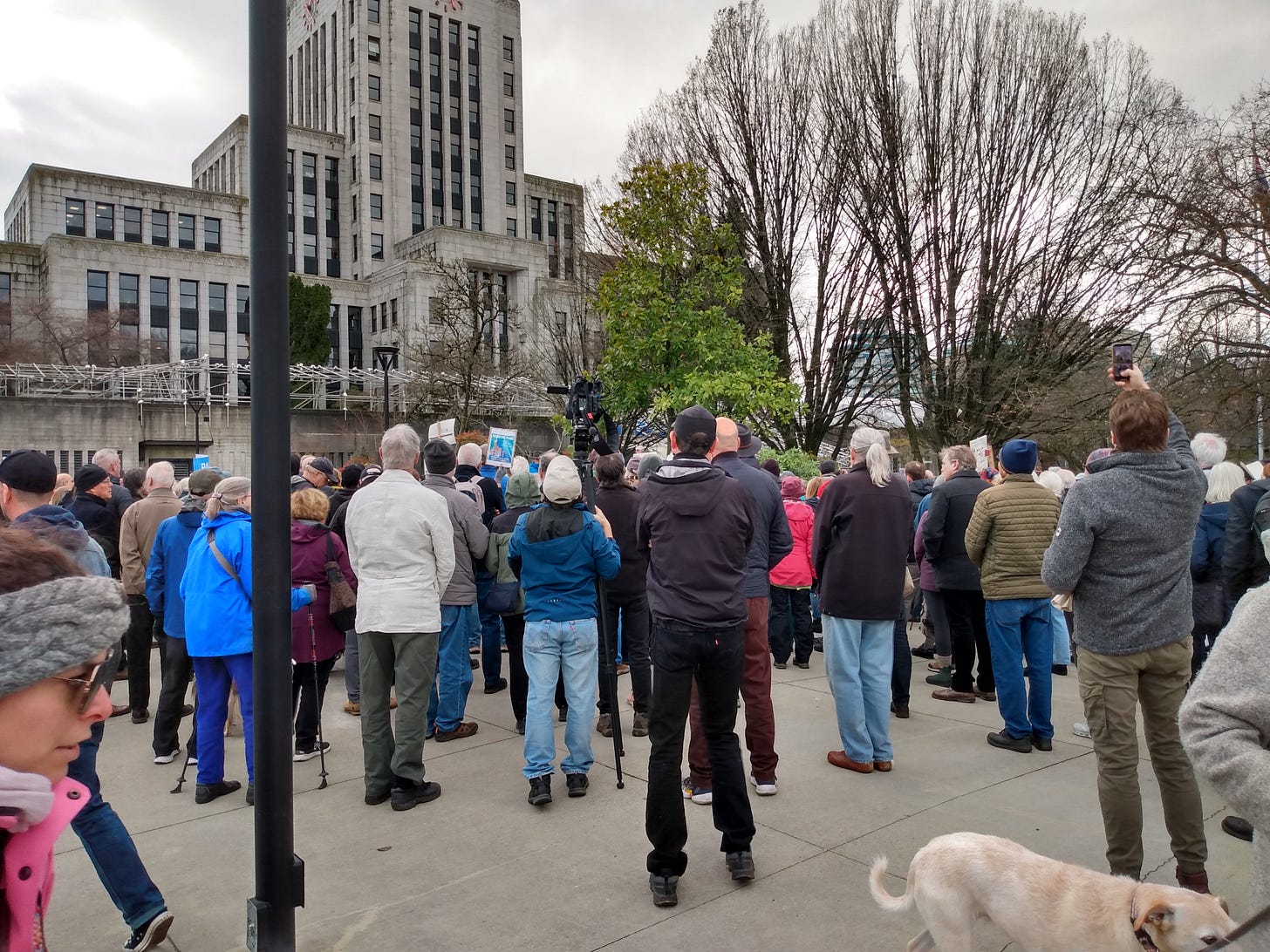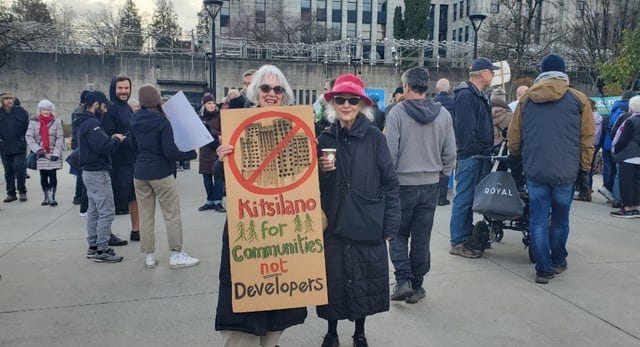Rally against the Broadway Plan
A quixotic battle
TLDR: TEAM and its allies are still trying to fight high-rise projects in the Broadway corridor, despite the Broadway Plan policy being approved two years ago. Not sure if they actually expect council to hesitate (which would be a huge win for them, though I don’t expect it to happen), or if they’re just trying to mobilize supporters for the upcoming council by-election (200-300 voters isn’t a lot, but 200-300 volunteers is pretty good).
The provincial and federal governments contributed $2.8 billion in funding for the Broadway subway, and the city agreed to allow more height and density in the area. The Broadway Plan policy was approved by council in 2022 by a 7-4 vote, after a lot of public consultation. But the city didn’t actually update its zoning laws, so every project still needs to go through the labour-intensive rezoning process, even if it complies with the policy.
Parenthetically, every one of the councillors who voted No on the Broadway Plan - Colleen Hardwick (TEAM), Jean Swanson (COPE), Melissa De Genova (NPA), and Michael Wiebe (Green) - lost their seat in the 2022 election (along with Kennedy Stewart, who voted Yes), as part of the ABC sweep.
Whenever there’s a particularly contentious battle coming up, with a lot of opposition, I’ll often make a post to Reddit to make it easy for people to write in, as I did a couple weeks ago for one of the first rezonings under the Broadway Plan, on West 14th near Arbutus, a few minutes south of the new station at Broadway and Arbutus.
This time around, CityHallWatch was apoplectic. Erick Villagomez talked about it on LinkedIn. Kerry Gold took notice, writing an article in the Globe and Mail based on talking to Colleen Hardwick, David Fine, and Theo Abbott (all affiliated with TEAM), as well as myself: Vancouver’s public consultation process is being abused, critics say.
As I understand it, there’s two complaints:
The Broadway Plan is destroying neighbourhoods and communities for the benefit of greedy developers, and we’re helping them. Why are people writing to council to support these projects who don’t live in the neighbourhood, or even in the city of Vancouver?
Why am I even doing this? I must be in the pay of developers.
Why we need to build up
TEAM organized a rally against the Broadway Plan on Saturday. On Reddit, the reaction was pretty critical. In response to the criticism, someone commented in support of the rally:
I’ll never get how people who don’t live in that neighbourhood or aren’t part of that community think they have this power and knowledge of what is good or what is bad for said community.
It’s not your community. It’s not your neighbourhood. If people in that neighbourhood are rallying against development for the super rich, then there’s probably something to it.
I always think of it as territoriality vs. "we live in a society". Living in a city like Vancouver, we're participating in a large-scale system of cooperation, way beyond the boundaries of individual neighbourhoods. I work to produce goods or services that other people want, and I rely on other people to produce goods or services that I want. We all depend on the health-care system, for example. Where are the people who work in health care going to live? Are they all going to drive in from Surrey or Langley?
I understand that lots of people don't like high-rises. But Vancouver has limited land, because of the ocean and mountains. As the population ages and people retire, as people's incomes rise and they want more space (e.g. instead of living with roommates), as the economy grows and we add more jobs, we need more housing. That means we need to build up, especially in central neighbourhoods like the Broadway corridor, with lots of public-transport capacity so fewer people need to drive long distances to work and add to traffic congestion.
Harmon Moon has a great metaphor: Vancouver's neighbourhoods are like bonsai. They're quiet and beautiful, but we haven't allowed them to grow.
Why housing supporters are angry
I understand that people want to minimize change to their neighbourhood. They like it the way it is, that’s why they live there. But this imposes tremendous costs on everyone else, across the entire region. It’s like pushing down on a balloon - when you don’t build new housing, the people who would have lived there don’t vanish into thin air, they end up competing with everyone else over the limited supply of existing housing, pushing up prices and rents everywhere else.
There’s a lot of younger people and renters (on Reddit and elsewhere) who are boiling mad, as you can tell from their comments (or from the polls showing how well Pierre Poilievre is doing with younger people). A sarcastic comment on an earlier rezoning:
Such a tall 25 story building will have a major impact on the neighbourhood character. Vancouver's culture of homelessness and economic despair due to housing shortages is valuable and something we must seek to preserve.
Tall buildings are scary and will damage this culture. I oppose this building so that we can maintain the housing crisis in Vancouver, which is a crucial part of the city. In addition, the current process of asking random people whether or not a building can be built is highly effective and we should encourage it to continue.
Why am I doing this?
In the comments on Kerry Gold’s article, David Fine asked: do you receive any funding from the real estate industry? Why do you spend so much time doing this?
The answer is no, I don't. The Vancouver Area Neighbours Association doesn't even have a bank account - an online community doesn't cost anything. For me, one of the great joys in life is arguing about politics with strangers on the Internet. This is true for a lot of people. Submitting comments and speaking at public hearings is a natural extension of this.
One correction to Kerry Gold's article is that I don't “run” VANA. It's much more informal than that.
I think of this volunteer activity as similar to that of the neighbourhood associations, the Coalition of Vancouver Neighbourhoods, and CityHallWatch. We all want to make the city a better place, and we're willing to volunteer our time to do so. (And of course CityHallWatch is happy to comment on housing across the city - I’ve watched Stephen Bohus at countless public hearings.) Our disagreement is primarily about the diagnosis: what's causing housing to be so expensive?
The MacPhail Report makes the answer pretty obvious: housing is scarce and therefore expensive because it's extremely difficult to build new housing. We’re not going to fix Vancouver’s long-standing housing shortage without building a lot more housing.
Arguments for and against the Broadway Plan
We had a table at the anti-Broadway Plan rally on Saturday. We printed postcards summarizing the arguments both for and against.
For the Broadway Plan:
People want to live and work here (e.g. in healthcare); other people want to build housing for them. When we don’t build enough, prices and rents must rise to unbearable levels to push people out
With limited land, we need to build up, especially where land is expensive: in central neighbourhoods, with easy access to jobs
To grow, neighbourhoods need infrastructure, especially transport. SkyTrain is adding a lot more transport capacity in this corridor
Against the Broadway Plan:
People want to live in the neighbourhood for its quiet and beauty, but by moving here in large numbers, they risk destroying it
New high-rise apartments will be expensive and tiny. Instead, we should be adding low-rise apartments everywhere, including here
There’s lots of old low-rise buildings here, and the renter protections in the Broadway Plan are untested
Responses to the opposing arguments:
As Harmon Moon puts it, Vancouver’s neighbourhoods are like bonsai: they’re quiet and beautiful, but we haven’t allowed them to grow. In a central neighbourhood, this makes them incredibly expensive, a barrier to newcomers who aren’t super-rich. Or as Nolan Gray describes it:
Gray was talking about older folks in extremely expensive neighborhoods that were once middle class, and how these older residents will wonder why, for example, their children are leaving, and they feel lonely and isolated in their retirement years. “Their community has been destroyed by not allowing the built environment to change,” he said.
Allowing low-rise apartments everywhere would be great - they’re much faster to plan and build than high-rises, and construction cost per square foot will be lower. But in the centrally located neighbourhoods along the Broadway Corridor, the cost of land is high, because demand is high. (Not because of zoning - you could upzone to allow 80 storeys on the outskirts of Saskatoon, and it wouldn’t cause land values to rise.) So for a low-rise, the cost of land per square foot of floor space will be much, much higher than for a high-rise.
To me, the risk of displacement is definitely the biggest issue, and the first test of the renter protection policies in the Broadway Plan will be when an old low-rise building gets replaced with a new high-rise, including 20% non-market rentals for the current renters, at their current rents. (They’ll be smaller, because construction costs per square foot have gone way up, but they’ll be brand-new, and therefore less precarious.) But the opposition is just as loud when there’s a project that involves very little displacement, replacing four or five detached houses, or zero displacement: replacing a former Denny’s at Broadway and Birch, an office building at Broadway and Granville, a strip mall at Kingsway and Fraser, a Safeway at Broadway and Commercial.
More
The Broadway Plan - approved in 2022
Location, location, location - why location matters
CityHallWatch on Reddit mobilization, January 2024. They don’t like it.
A Twitter thread to answer questions
An exchange on Reddit with a commenter who rents in Kitsilano, and who is opposed to high-rises
An exchange on LinkedIn with Erick Villagomez
CityHallWatch is planning to post the speaking notes from the rally




Didn't you run for council too Russill? ABC was backed by developers and my guess is that you are simply a private investor trying to fan your profits at this point. As a born and raised Vancouverite, I can attest to the displacement and gentrification here from the Okanagan and yes, I'm lonely without my friends and family and seething mad!